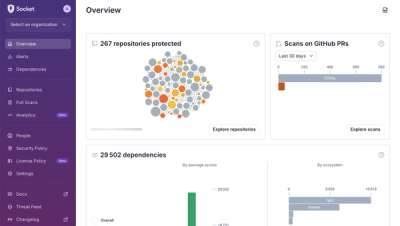
Research
wget to Wipeout: Malicious Go Modules Fetch Destructive Payload
Socket's research uncovers three dangerous Go modules that contain obfuscated disk-wiping malware, threatening complete data loss.
@arista/grpc-web
Advanced tools
Library for making gRPC-Web requests from a browser
This library is intended for both JavaScript and TypeScript usage from a web browser or NodeJS (see Usage with NodeJS).
Note: This only works if the server supports gRPC-Web
A Golang gRPC-Web middleware and a Golang-based gRPC-Web proxy are available here.
Please see the full gRPC-Web README for known limitations.
@improbable-eng/grpc-web has peer dependencies of google-protobuf and @types/google-protobuf.
npm install google-protobuf @types/google-protobuf @improbable-eng/grpc-web --save
There is an example project available here
ts-protoc-gen with protoc to generate .js and .d.ts files for your request and response classes. ts-protoc-gen can also generate gRPC service definitions with the service=true argument.
unary(), invoke() or client()import {grpc} from "@improbable-eng/grpc-web";
// Import code-generated data structures.
import {BookService} from "./generated/proto/examplecom/library/book_service_pb_service";
import {GetBookRequest} from "./generated/proto/examplecom/library/book_service_pb";
const getBookRequest = new GetBookRequest();
getBookRequest.setIsbn(60929871);
grpc.unary(BookService.GetBook, {
request: getBookRequest,
host: host,
onEnd: res => {
const { status, statusMessage, headers, message, trailers } = res;
if (status === grpc.Code.OK && message) {
console.log("all ok. got book: ", message.toObject());
}
}
});
const request = grpc.unary(BookService.GetBook, { ... });
request.close();
There are three functions for making gRPC requests:
grpc.unaryThis is a convenience function for making requests that consist of a single request message and single response message. It can only be used with unary methods.
rpc GetBook(GetBookRequest) returns (Book) {}
grpc.invokeThis is a convenience function for making requests that consist of a single request message and a stream of response messages (server-streaming). It can also be used with unary methods.
rpc GetBook(GetBookRequest) returns (Book) {}
rpc QueryBooks(QueryBooksRequest) returns (stream Book) {}
grpc.clientgrpc.client returns a client. Dependant upon transport compatibility this client is capable of sending multiple request messages (client-streaming) and receiving multiple response messages (server-streaming). It can be used with any type of method, but will enforce limiting the sending of messages for unary methods.
rpc GetBook(GetBookRequest) returns (Book) {}
rpc QueryBooks(QueryBooksRequest) returns (stream Book) {}
rpc LogReadPages(stream PageRead) returns (google.protobuf.Empty) {}
rpc ListenForBooks(stream QueryBooksRequest) returns (stream Book) {}
Refer to grpc-web-node-http-transport.
FAQs
gRPC-Web client for browsers (JS/TS)
The npm package @arista/grpc-web receives a total of 2 weekly downloads. As such, @arista/grpc-web popularity was classified as not popular.
We found that @arista/grpc-web demonstrated a not healthy version release cadence and project activity because the last version was released a year ago. It has 3 open source maintainers collaborating on the project.
Did you know?

Socket for GitHub automatically highlights issues in each pull request and monitors the health of all your open source dependencies. Discover the contents of your packages and block harmful activity before you install or update your dependencies.

Research
Socket's research uncovers three dangerous Go modules that contain obfuscated disk-wiping malware, threatening complete data loss.

Research
Socket uncovers malicious packages on PyPI using Gmail's SMTP protocol for command and control (C2) to exfiltrate data and execute commands.

Product
We redesigned Socket's first logged-in page to display rich and insightful visualizations about your repositories protected against supply chain threats.